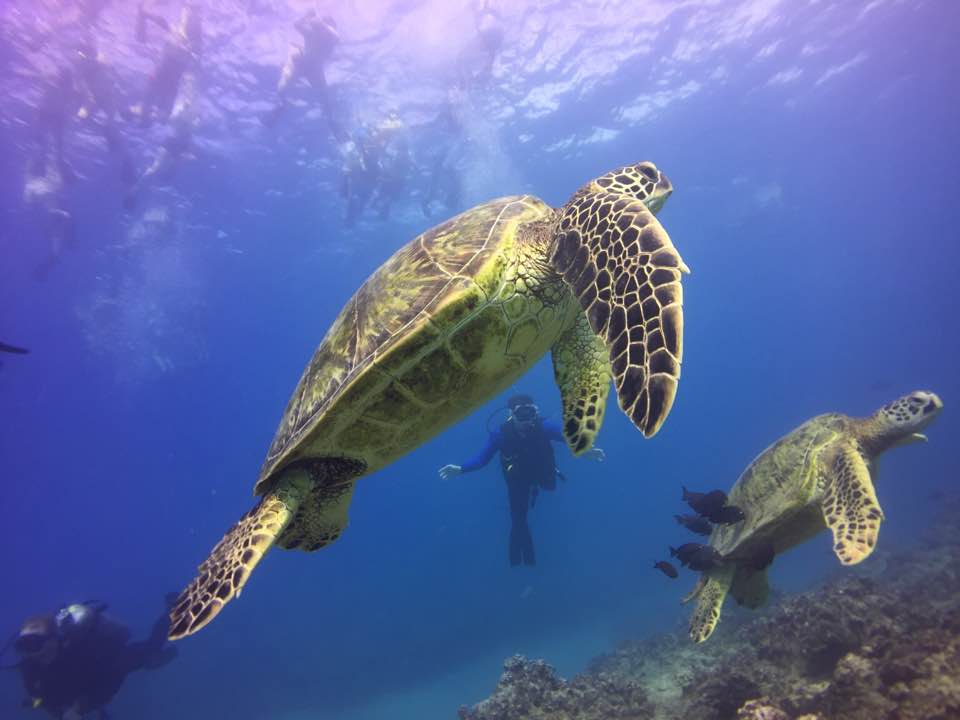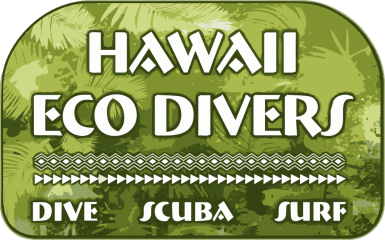TOP 5 ECO-FRIENDLY DIVING TIPS IN HAWAII

Eco-friendly diving and ocean conservation are two things we take to heart at Hawaii Eco Divers.
When people think of Hawaii they think of sparkling blue coastlines, warm white sands and surfers playing in crystal clear waves. Each year, nearly 10 million people flock to Hawaii’s world class beaches for a little taste of paradise. That’s 10 million people sipping Mai Tais, learning to surf, fishing, snorkelling and diving. That’s a lot of people! With this much heavy traffic it’s important we protect the very thing that makes these islands so special. Eco-friendly diving goes beyond the acts you take while underwater. Eco-friendly diving is an extension of eco-friendly tourism and an eco-conscious life. That’s why we put together this quick guide so you can go beyond eco-friendly diving and help #savetheocean on your next Hawaiian vacation.

1) Choose eco-friendly operations
When selecting your adventures it’s important that your tour guides understand and respect the environment they’re taking you into. Remember, they’re not just taking you, they’re taking 10 million people a year! So make sure to only book with reputable, conscientious companies like Hawaii Eco Divers that promote activities that support the local environment for generations to come. At Hawaii Eco Divers we promote sustainability and stewardship for the ocean by providing educational diving tours where we teach you about local flora and fauna – from a respectful distance!
2) Use reef safe sun block
Did you know that the majority of sunscreens actually damage and kill coral?! It’s true, the simple act of protecting yourself from sunburn can also injure one of the most beautiful ecosystems in the world. And without our corals we wouldn’t have places like Turtle Canyon where our iconic Honu, green sea turtles, go for their spa treatments! Sure, if it was just one person wearing it there wouldn’t be much impact but remember, we’re talking about 10 million people a year jumping into Hawaii’s warm waters! Worldwide it is estimated that 14,000 tons of these chemicals wind up in coral reefs every year.
When you’re loading up your bags for your next Hawaiian vacation make sure to steer clear of any sunscreens with the ‘Awful 8’: oxybenzone, octinoxate, avobenzone, octocrylene, PABA (Aminobenzoic Acid), enzacamene, octisalate and homosalate. Oxybenzone and Octinoxate have been found to kill healthy coral by making them susceptible to bleaching and to damage their DNA so that they cannot properly grow. It is also believed that oxybenzone could harm the marine animals among the corals, like shrimps and clams, by disrupting their endocrine systems.
Just in case you don’t think you’ll be able to rattle off the ‘Awful 8’ from memory, we’ve listed some of our favorite reef safe sunscreens here:
Kokua Hawaiian Natural Sunscreen
3) Don’t touch marine life
It is certainly very tempting to reach out and touch the amazing marine life you’ll find yourself surrounded by when swimming in Hawaii: sea turtles, monk seals, dolphins, white top reef sharks, eagle rays, octopuses, and Hawaii’s state fish – the Humuhumunukunukuapua’a. But don’t do it! Chasing and touching these animals can cause them stress, disrupting their natural patterns and reducing their chance of survival. In addition to that, we can unintentionally transmit diseases to them that can harm or kill them and the other animals it come into contact with.
This goes for corals as well. Yes, corals are living animals! They may look like plants or rocks but they are actually intricate animals that develop at incredibly slow rates. Growing between 0.3-10 centimeters per year, it can take 10,000 years for a coral reef to fully form! Humans can cause the death of an entire colony with just one touch. The natural oils on your skin can disturb the delicate membranes which protect the coral from disease. Standing on coral also kills the coral polyps that are the builders of the reef structure.
So please, never ever touch or stand on corals and help educate other beach goers as well. What may look like the perfect rock to rest on while you adjust your snorkel mask is actually an amazingly beautiful and fragile life form that is essential to the entire ecosystem!
4) Pick up after yourself & others
All big change starts from within and the same is true of ocean clean-up! Pick up after yourself and build an awareness of your impact on the environment. Did you know that cigarette butts are the number 1 man-made contaminant of the ocean? They are the single most littered item in the world, the filters take over 10 years to decompose and the chemicals they leach while they’re decomposing are deadly to the marine ecosystem.
The most important step you can take to protecting the ocean is being a role model for others to follow. Model responsible behavior by picking up not just after yourself but others as well. You might not have thrown that plastic bag on the sand but if you don’t pick it up, one of our local honu and visiting humpback whales are likely to choke on it! So, even though you’re on your dream Hawaiian vacation, take a moment to help us keep this dream alive.
Picking up plastic litter is an obvious benefit but other litter items can be just as dangerous to marine life. If you see cigarette butts in the sand, do the reef a favor and pack those out with you as well. And if you’re swimming or diving and come across discarded fishing lines please help us clear those out as well. They entangle fish, dolphins, sharks and turtles long after the fishermen who cast them have walked away.
Trust us, when people see you nonchalantly picking up the litter they just threw away, they’ll rethink their actions going forward.
5) Take the time to enjoy nature
This is possibly the most important item on the list! Take a moment every day to stop and recognize the wonder that nature has created all around you. When we recognize the true paradise we live in we will naturally take steps to protect it and spread our love of nature to others.
Written by Shawnee Canjura
